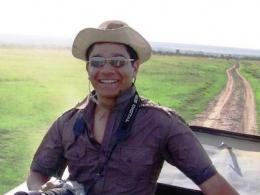Maria Ly is quite literally a Rock Star. You’ll often find her hanging off a 5.13a grade rock climbing route, she is the rock star co-founder of Skimble (which is incubated by Rock Health), and you can find her rock formation photography featured in Outside Magazine.
Resources
Admissions in the US: Standardized Tests, Transcripts, Interviews, and More (Oh My!)

Applying for a university in the United States can be a difficult and seemingly complex matter. It can be a confusing task to take on what at first may appear to be an overwhelming amount of paperwork, test scores, transcripts, applications, essays and other abstract requirements you may or may not understand. Even American students applying to American universities often feel lost. Here, then, is an explanation to the typical process of applying and (hopefully) getting into a university in the United States, complete with information on SATs to letters of reference. Unlike Dorothy in The Wizard of Oz you don’t need any ruby slippers to get you there – this is the StudentRoads “yellow brick road”.
First Things First
Obviously, the first part of the application process to any US university is figuring out which universities you actually want to attend. Do your research on StudentRoads, bookmark universities which sound interesting on your personal profile, and check out the statistics section on our university profiles. Next, go to your shortlisted universities’ websites (you can find the links on the StudentRoads university profile) and navigate to the pages for international students. Here, you should find some valuable information about the application process. Actually – you should find all of the information you’ll need for the application process. For example, you’ll find out whether you need to submit SAT scores or ACT scores (or whether you need to submit them at all).
Standardized Tests
The SAT is a standardized test that many American universities require to be completed in order to be considered for admission. It covers math, critical reading and writing and must be completed in English. The test runs about three hours and 45 minutes and there is a wide array of study material available, both online and in print. The SAT can be taken at approximately seven dates per year and the cost is between 70 and 100 USD. To take the test, you must find an SAT testing center near you.
The ACT is a test similar to the SAT but features a different grading system and covers English, math, reasoning, and science. Like the SAT, the ACT must also be completed in English. Some universities will require you to take this test – instead of the SAT – in order to be considered for admission. There are five testing dates per year and tests cost around 70 USD. To take the ACT, you must find an ACT testing center in your country. If there is not an ACT testing center within 80 kilometers of your location, you may be able to make special arrangements. For further information, as well as a place to sign up, pay for the test and find out if there is an ACT testing center close to you, please see our link at the bottom of the page.
The TOEFL (Test of English as a Foreign Language) and IELTS (International English Language Testing System) both examine a student's ability to read, write, listen and speak in English. Most universities require proof of proficiency in the English language when it is not the native language of an applicant. Test centers are located throughout the world and often require advance scheduling of a test date. Universities will accept a student's most recent test score as proof of ability. Check each university's profile on StudentRoads for minimum TOEFL and IELTS test scores.

Transcripts
In addition to either SAT or ACT scores and, if applicable, the TOEFL, the university to which you’re applying will want to see your official education transcripts. These usually start from grade nine (when you were about 15 years old). Transcripts must be sent by your former educational institution directly to the university. They must not pass through your hands lest a student decides to get “creative” with their score. Transcripts must be translated into English and list all the grades and certificates / diplomas you received throughout your courses in high school. Generally your transcripts must also contain the dates you attended your high school(s), the name of each class you attended, and the credit or number of hours you earned for each course. There are services that will certify and translate your transcript for a fee (e.g. World Education Services).
Personal Essays
Your university’s application process is likely to require you to complete a number of personal essays in order to be considered for enrollment. Personal essay prompts usually question you on times when you have, for example, “overcome adversity” or “faced an ethical dilemma.” Alternatively, an application essay may want you to explain why you’re a good candidate for their university. Questions are generally personal in nature and are designed more to test your writing and argumentative skills rather than your knowledge of factual information. Personal essays must be well-written, unique, and StudentRoads recommends that you strictly adhere to the writing guidelines as stated on the application form. There are plenty of informational resources available both online and in print regarding how to write good application essays. The key is a university wants to get to know you and why you are special – not just to look at your statistics. Take your time, write a quality essay with authentic information, and remember to spell-check.
Recommendation Letters
Your university application may also want to see one or two recommendation letters (also known as letters of reference). In the case that your university wants two recommendation letters, it is most likely that they will want a personal recommendation letter and an academic recommendation letter. A personal recommendation letter is one you receive from a member of your community who knows you well, preferably someone prominent and with good social standing. This recommendation letter should speak of your character’s merits and express faith that you are indeed a fine candidate for admission. An academic recommendation letter is written by one of your former teachers, and should speak of your academic ability.
Interviews
Finally, you may be wondering if you need to complete an in-person interview. Since you’re an international student, an in-person interview is generally not a requirement and will not adversely affect your admission status. However, interviews can be helpful as university officials can get to know you and your personality, which is sometimes difficult to impart in an application. If you do want to set up an interview you usually need to travel to the university to have one there. Alternatively, you may have the opportunity to set up an interview with an alumnus that’s living in your home country. This is a great option if it is available. To learn more you must contact the international office at the university to which you’re applying.
That should cover most of the specifics associated with the application process. Keep in mind that the international office of the university to which you are applying is just a phone call away so don’t be afraid to call and ask if you have something you just can’t figure out. And so now that you know – get to work! This is where the journey begins … and be sure to come back to StudentRoads to leave a review of your university to help other students and promote good karma.
[Top image credit: iStockphoto/Thinkstock; Second image credit: iStockphoto/Thinkstock]
© 2012 StudentRoads. All rights reserved. Do not reprint without permission.






Add Comment